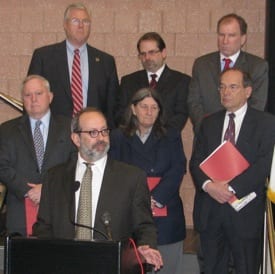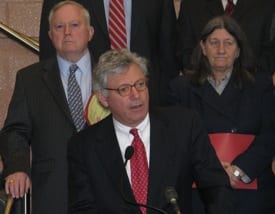Who is a member?
Our members are the local governments of Massachusetts and their elected and appointed leadership.
A coalition of statewide municipal, school and community leaders today said a municipal health insurance reform proposal released by the House last week is critical to controlling a budget buster that has been draining municipal resources and forcing layoffs of teachers, police officers, firefighters and other key personnel.
 At a press conference at a public middle school in Revere, the organizations urged the Legislature to pass the plan, which was included in the fiscal 2012 state budget bill proposed by the House Ways and Means Committee.
At a press conference at a public middle school in Revere, the organizations urged the Legislature to pass the plan, which was included in the fiscal 2012 state budget bill proposed by the House Ways and Means Committee.
MMA President and Natick Selectman Joshua Ostroff called the proposal “a matter of the highest priority, for all the organizations here today.”
“To get this state on the road to recovery,” he said, “and to sustain the recovery that’s under way, we really need to be able to provide fair value to taxpayers, and they can’t get fair value when they’re subsidizing health insurance premiums and deductibles that are way out of scale with what state employees have and what private sector employees have.”
Revere Mayor Thomas Ambrosino joined the other local and school officials in thanking House Speaker Robert DeLeo and House Ways and Means Chair Brian Dempsey for putting forth “the most critical piece of municipal relief legislation in years.”
“In many communities, like Revere,” he said, “the increase in the single line item for health insurance exceeds what we can raise under Proposition 2 1/2 for the year. After four years of local aid cuts, this is a way for us to finally gain some financial relief.
“We look at this as a job-savings bill,” Ambrosino said. “Without this kind of relief, many communities will be looking at laying off union employees.”
Under the plan proposed by House leaders, cities and towns would be able to change the co-pays and deductibles in employee health plans without going through the collective bargaining process with unions. The co-pays and deductibles could be no higher than those for state employees in plans offered by the state’s Group Insurance Commission. Communities would also have the power to join the GIC if they demonstrate that doing so would provide more savings than making plan design changes on their own.
 Ten percent of the savings – or costs avoided – in the first year would be set aside to fund a health reimbursement account that would be structured based on an agreement between municipalities and their unions.
Ten percent of the savings – or costs avoided – in the first year would be set aside to fund a health reimbursement account that would be structured based on an agreement between municipalities and their unions.
The plan would not change the requirement that cities and towns must negotiate any change in the employee-employer premium share, leaving municipal unions with more collective bargaining authority over health insurance than state employee unions have. Communities would also have to bargain with unions over any proposals to have higher co-pays than state employees.
The organizations estimate that the House proposal, which would give cities and towns the same power the state has to implement changes in health insurance plans for employees, would save local taxpayers up to $100 million in avoided costs statewide.
“We’re here saying that we need to bring these costs under control, otherwise this will eat us alive,” said New Bedford Mayor Scott Lang, president of the Massachusetts Mayors’ Association. “The fact is that if we continue on the path that we’re on now, there will be very few employees who enjoy these fabulous Rolls Royce plans. … If we’re going to continue on this road, the only way to pay for it is with layoffs, which means fewer services, lower quality of education, and less ability to rebound and to grow.”
Lang pointed out that the House proposal would not “in any way denigrate the quality of health care, or the quality of the plans that we have.”
“No one who works for a municipality will have a plan that isn’t as good as, or better than, what state employees have,” he said.
Joseph Esposito, a member of the board of the Massachusetts Business Alliance for Education, referred to a report the organization released last December, which found that the growth in school employee benefit costs statewide between fiscal 2002 and 2007 exceeded the growth in Chapter 70 education aid by $300 million.
“MBAE believes that maintaining the quality of schools and other services is critical to the economic future of Massachusetts,” he said. “And unless these employee benefit cost issues are addressed, education cuts and layoffs will intensify in the next several years. Health care has become, effectively, the ultimate education issue.”
Lynnfield School Committee member Dorothy Presser, who serves as president of the Massachusetts Association of School Committees and president of the Suburban Coalition, said, “The rising cost of health insurance every year whittles away our ability to put resources in the classroom for our kids.”
A report released this month by the Massachusetts Taxpayers Foundation and The Boston Foundation concluded that municipal health plans cost taxpayers millions more than state, federal or private insurance plans because municipal unions can veto any changes in the plans. The report said the Legislature must give local officials the authority to adjust insurance plans outside of collective bargaining. Without this action, the report said, “Communities will be forced to make even more painful and severe cuts to education and other basic services.”
The organizations represented at the press conference calling for passage of the health insurance reform measure are: the Massachusetts Municipal Association, the Massachusetts Association of School Committees, the Massachusetts Association of School Superintendents, the Massachusetts Business Alliance for Education, the Massachusetts Mayors’ Association, the Massachusetts Selectmen’s Association, the Massachusetts Municipal Councillors’ Association, the Massachusetts Municipal Management Association, the Association of Town Finance Committees, and the Suburban Coalition.
The full House is scheduled to begin debate of its budget bill on April 25.